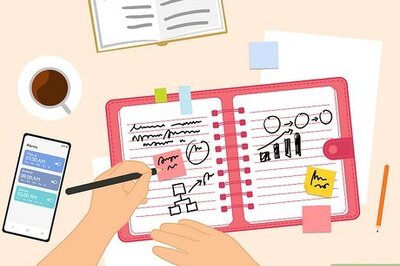
views
Prioritize important tasks.

You can only get so much done in a day. Chances are, there are lots of tasks and projects threatening to fill up your schedule, making it difficult for you to buckle down and concentrate. Before you get started, pinpoint your most important task of the day, and focus on completing that first. Once that project is out of the way, it’ll be a lot easier to be productive for the rest of the day. For example, if you work for a magazine, you’d focus on revising an old article before you start writing a new one.
Cut back on distractions.

Social media, email, and other sites can be big time-wasters. Before jumping into your next task, close out any browsers or applications that aren’t essential to the project at hand. While you’re at it, set your phone to silent or do not disturb, so you aren’t distracted by texts, calls, or notifications. Dedicate a separate part of your day to checking email and social media, so you aren’t as tempted to do it at work.
Practice the 2-minute rule to accomplish short tasks.

If you can finish a task within 2 minutes, do it right away. Throughout your work day, small tasks and projects might pop up on your radar, like replying to an email or filling out a form. Before putting these tasks on the backburner, ask yourself if you can finish them within a couple of minutes. If the answer is “yes,” do that task right away. For example, if a co-worker shoots you a short email, reply to it right away instead of answering later.
Break up tasks in 90-minute segments.

Working for hours and hours on end can be overwhelming. Instead, plan to work on a specific task for 90 minutes or less. Studies show that people who work in smaller, more manageable chunks of time are actually more productive than people who work for hours and hours. If 90 minutes feels a bit overwhelming, you could try working in 25-minute chunks while using a timer. Once the timer dings, take a break for 5 minutes, and then set your timer for another 25 minutes. Once you’ve completed four, 25-minute cycles with 5-minute breaks, reward yourself with a 15-30 minute break.
Chunk your meetings with appointment slots.

Google Calendar offers a special Appointment Slots option. With this tool, you can divide your meetings and calls into smaller chunks like 60 minutes, 30 minutes, and 10 minutes. Once you’ve chunked your calls and meetings, use a link creation site like “bit.ly” to share these appointments with other people. For instance, you might schedule quick business calls for 10 minutes, and slot at least 60 minutes for important meetings. When you divide your meetings into specific slots, it’s a lot easier to concentrate on the appointment at hand.
Ask for deadlines instead of setting them yourself.

Studies show that self-created deadlines don’t really improve productivity. Instead, chat with your boss or client and establish concrete deadlines for upcoming projects and assignments. This way, you’ll have an easier time concentrating, and you won’t be tempted to push your deadlines back. If you have a lot of tasks on your plate, make sure you space out your deadlines so you aren’t spreading yourself too thin.
Set SMART goals for yourself.

SMART goals are Specific, Measurable, Achievable, Relevant, and Time-Bound. Start by figuring out the who, what, where, which, and why of your goal. Then, set some milestones for your goal, so it’s easier to track your progress. Once you have the basics figured out, plan how you’ll actually achieve the goal, and how that goal fits into the larger objectives of your work. To make your goal easier to accomplish, create a specific timeline for your task. For instance, if you worked for a sales company, you could create a specific goal to create a brochure to attract new customers. You could plan for the brochure to be at least 500 words and have at least 4 graphics. Then, you could set specific milestones as you complete different segments of the document. You could aim to finish the brochure by a certain date, with the hope of increasing sales at your business.
Organize your workspace.

It’s hard to concentrate when your workspace is cluttered. In fact, studies show that a messy work area can take a toll on your productivity. As a starting point, use Marie Kondo’s classic cleaning and decluttering technique to organize your space. Ask yourself if you need each item, or if it’s just taking up extra room. As you clean and reorganize, take time to reassess what’s most important, and if the items in your workspace really line up with those priorities. For example, as you go through your old business receipts, ask yourself if you need each form, or if they’ve already served their purpose. Feel free to recycle any receipts that you don’t need anymore.
Reward yourself.

The prospect of rewards might help you concentrate. After you finish a certain task, give yourself a small reward for being productive. This might be a short walk down the street, a glass of water, or a few minutes browsing social media. If you’re tackling an especially big task, you could reward yourself with a movie night, your favorite takeout, or a night binging your favorite TV show. For a small task, you might reward yourself with your favorite snack, or play a game on your phone for a few minutes.
Practice mindfulness.

Mindfulness is a great way to help you focus. Take a couple minutes to sit still with your eyes closed. As you sit, pay close attention to your breathing, along with any other sounds nearby. Mindfulness is all about focusing on the present, instead of getting distracted with the business of day-to-day life. You could practice mindfulness when you first wake up, or while you’re taking a break at work. Meditation is another great way to boost focus and concentration. Some people find concentrative meditation helpful, where you focus on something specific, like an object or word. Other people find moving meditation really helpful, like yoga and tai chi.
Download an awareness app.

An awareness app reminds you to refocus during the day. At random points during your work day, your awareness app will ping your phone. Once you see the notification, take a moment to recenter and refocus yourself on the task at hand. ZenChimes is a completely free option, while Insight Timer costs $2 to download.
Sip a caffeinated drink.

Caffeine helps you feel more focused and on-task. Before you get started with your daily workload, sip a cup of coffee, or another caffeinated drink of choice. Afterward, you might find it easier to concentrate on your work. Caffeine can be useful in moderation. However, if you drink several cups of coffee each day, your body will adjust to the extra caffeine boost. If you can, only drink 1 cup of coffee per day.
Snack on healthy fats.

Your brain needs plenty of healthy fats to operate at top speed. Fill your meals with plenty of nutritious, fatty foods, like eggs and avocados. If you’re hankering for a snack, you could munch on a handful of nuts. Certain fish and seafood, like anchovies, herring, sardines, trout, tuna, mussels, and oysters, are great sources of healthy fat. Edamame, kale, spinach, flaxseeds, chia seeds, mayonnaise, beans, and brussels sprouts are other excellent sources of healthy fat.
Try intermittent fasting.

Intermittent fasting (IF) may improve your concentration and focus. With IF, you don’t eat for 16 hours each day, and then eat all of your daily calories in the remaining 8 hours. Some dieters find that skipping breakfast, drinking coffee, and eating between 1 and 9 PM can do wonders for your concentration. Tinker with your own personal schedule and see what works best for you!
Get a good night’s sleep.

Aim to get at least 7 hours of shut-eye every night. Heading to work exhausted makes it much harder to concentrate. To get the most out of your work day, head to bed at least 7 hours before your alarm goes off, so you can wake up feeling well-rested.
Exercise each morning.

A 20-minute round of morning exercise can improve your focus. Pick any activity that gets your heart racing, whether it’s going for a jog, completing a few laps in the pool, or hitting the tennis courts. Surprisingly, a little exercise can go a long way for your daily concentration. If you aren’t a fan of traditional running or walking, you might try racquetball, or go for a bike ride.




















Comments
0 comment